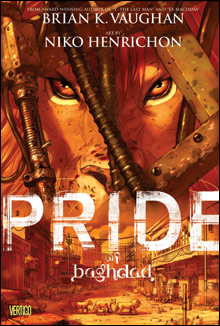
ANIMAL FARM ? Pride of Baghdad is a talking-animal story but a muted, despairing one. |
Brian K. Vaughan is one of the highest-profile writers in American comics right now, a hyper-prolific idea man whose projects are driven by crisp, suspenseful pacing and built around resonant metaphors. The one he’s gotten the most attention for recently is Pride of Baghdad (Vertigo), a graphic novel (with exquisitely colorful art by Niko Henrichon) based on the story of the lions who escaped from the Baghdad zoo during the American bombing. It’s a talking-animal story, but a muted, despairing one — these lions stand in for the civilians affected by the clash of nations, forced to wonder whether the liberty they’ve longed for is worth the loss of their homes and perhaps their lives.Vaughan is wrapping up his work on Runaways (Marvel), a superhero series with a fervent cult following that includes Buffy the Vampire Slayer creator Joss Whedon, who’s taking it over when Vaughan leaves in a few months. On top of that, he’s the co-creator and writer of two ongoing comic-book series, Y: The Last Man (Vertigo) andEx Machina (Wildstorm), and he’s writing two comics mini-series: The Escapists (Dark Horse), which is a sequel of sorts to Michael Chabon’s novel The AmazingAdventures of Kavalier & Clay, and Dr. Strange: The Oath (Marvel). He’s also working on scripts for a not-yet-announced TV project and three movies that include potential film versions of Y and Ex Machina.
“People always think they shouldn’t let writers adapt their own stuff because they’re too close to it, but re-readingY, all I see is the mistakes I made,” Vaughan tells me when we meet in New York. “And so the film script is a completely new plot — the same characters, the same ideas, but it’s a movie and not a comic book.” He argues that it’s a bad idea for a film adapted from a comic book to try to tell the same story. “I don’t think the translation of [Frank Miller’s comic book] Sin City to film made it any better, for instance. I’d rather re-read the comic, or get a whole new experience.”

Vaughan has a background in moviemaking: he double-majored in dramatic writing and film at New York University. Yet he says his interest in comics has affected his movie writing more than the other way around. “My development as a writer has been about saying more with less. You have to choose your moments carefully in comics, even more than in screenwriting. Every page is its own little three-act structure, with a beginning, middle, and end; every page has a mini-cliffhanger, every scene has a major cliffhanger, and every issue has an ultimate cliffhanger. That’s the way that I write, and I’m sure some people find it formulaic, but I think it’s a good structure that you can fit any kind of story into.”
Even as he’s revising the Y: The Last Man movie script, Vaughan is writing the last half-dozen or so issues of the comic, which from the beginning he had planned to end with #60, due out next August. Y is a satire about patriarchal culture and gender roles whose twist is that there’s only one man in it. The premise is that something has abruptly and instantly killed everything male on Earth except for a 22-year-old escape artist named Yorick and his pet monkey, Ampersand. Over the course of the series, we follow Yorick across the globe as he spends five years growing, as Vaughan puts it, “from the last boy on earth to the last man on earth” and see how the world has changed — and hasn’t — without men.
Vaughan has had the conclusion ofY plotted out since he proposed the series. “I do sometimes second-guess the ending, because I was 24 or so when I pitched it. [He’s now 30.] Part of me feels an allegiance to that kid’s story — it could still change, but it probably won’t.” His collaboration with artist Pia Guerra has helped to shape the story’s course: “We sort of go against gender stereotypes. I’d like to have the characters sit around and drink coffee for 22 pages, and Pia really prefers motorcycle chases and people tossed through windows, so we complete each other in that way. Some of the best Y stories have been suggestions of Pia’s that take it in an unexpected direction. She made an offhand comment one day that if the protagonist is an escape artist, then an antagonist for him would be a master of bondage. That inspired ‘Safeword’ [#4 of Y], which has really been the heart of the series for me.”